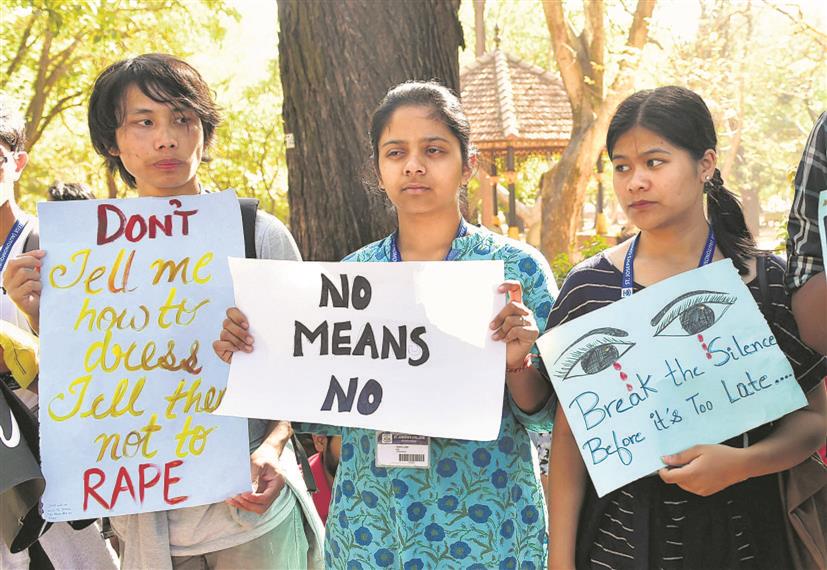
ABYSMAL: The conviction rate in rape cases is below 30 per cent in India. PTI
Sankar Sen
Ex-Director, National Police Academy
THE Maharashtra cabinet recently approved the draft of the Shakti Criminal Law Bill which provides for death penalty for serious offences such as rape and child abuse. The Andhra Pradesh government is also reportedly enacting a law containing a similar provision of death penalty for rape. This brings to the fore the question whether death penalty will act as a deterrent against growing incidence of rape in the country. Will the fear of death scare and deter the rapists?
There is no doubt a surge in rape cases across the country. Delhi has earned the dubious sobriquet of being the ‘rape capital’. According to the Annual Crime Report of the National Crime Records Bureau (NCRB), 32,033 rape cases were registered in India in 2019, as against 33,356 in 2018 and 32,599 in 2017. This slight drop in cases in 2019 was perhaps due to the fact that data from West Bengal was not available. Ironically, the perpetrators of these heinous crimes were found to be related or known to the victims.
The number of cases registered by the police represent only the tip of the iceberg. As per a conservative estimate, about 20 per cent of the crimes under various heads go unreported or unregistered. But even these suppressed and minimised crime figures do not conceal the fact that there has been a substantial escalation of crimes against women, particularly rape. This is mainly due to the uproar in the media, demanding immediate action against the perpetrators, as well as vigorous campaigns by the civil society and willingness of the victims to report such crimes. These factors are responsible for improved reporting and registration of cases.
Admittedly, whenever an alarming case of rape is reported, there is outpouring of public sympathy for the victim and a shrill cry for retributive justice. Political leaders, eminent personalities and social activists demand nothing less than death penalty as if that is a magic bullet which will eliminate all dastardly crimes against women. Therefore, after Unnao and Kathua rape cases, there was a predictably loud public uproar and the Central government brought in an ordinance providing for death penalty for the rapists. The demand was stridently voiced by political leaders, including the Speaker of the Lok Sabha.
Earlier, after the 2012 Nirbhaya rape case, the Criminal Law Amendment Act of 2013 was enacted, amending the IPC, POCSO (Protection of Children from Sexual Offences) Act and the Indian Evidence Act, prescribing death penalty for rape. However, the prevalent popular notion that fear of death will scare the rapists and reduce incidents of rape is perhaps not tenable and requires a close, hard look.
Admittedly, there is an ominous possibility of the perpetrators killing the victims or committing violence on them in order to avoid identification. Further, the judges dealing with such cases would require watertight evidence before convicting an accused in a rape case where the punishment is death. Moreover, finding flaws in the police investigation will not be difficult. As most of the rape cases are reportedly perpetrated by close relatives and acquaintances, with death penalty looming large, the victims will be under tremendous pressure from the kin not to report such cases, resulting in huge suppression of cases. The other apprehension is that under the existing criminal justice system in the country, tough laws are likely to operate more against the weaker and poorer sections of society, who cannot engage expensive lawyers and perforce have to rely on legal help provided by the State.
Law enforcement officers and criminologists are of the view that the real deterrent against crime is certainty and not severity of punishment. Today, the country sees 88 cases of rape a day but the conviction rate is below 30 per cent.
Therefore, for controlling and curbing crimes of rape, some practical steps are called for. Knee-jerk reactions, like provision in law of death penalty for rape, with a view to catering to the public outcry for tough justice, is not the remedy. First, it is necessary to get an idea of the magnitude and dimension of the crime as most cases of rape remain unreported because of the stigma involved. This phenomenon is not only prevalent in India but also in other countries. A Crime Victim Survey in Australia revealed that only 32 per cent of the victims reported sexual assault. A similar survey (2016) in the US shows that only 23 per cent of rape cases were reported to the police. Instead of only relying on police figures and statistics, crime victim surveys are necessary to get a clear idea of the magnitude of the crime before fashioning proper strategies. A crime victim survey in the NCR, conducted by the Institute of Social Sciences, revealed lack of public trust in the police.
Thus, investigation and prosecution of cases must improve. Acute shortage of women police officers, trained in sympathetic and supportive interviewing techniques, affects the police investigation. Though chargesheets are filed in 80 per cent of the rape cases, there is a high rate of acquittal due to delay in trials, witnesses turning hostile and poor prosecution. Though some special courts have been set up to expedite trial of rape cases, they often fail to quicken the pace of justice delivery due to paucity of judges.
The Justice Verma Committee, set up after the Nirbhaya case, did not recommend death penalty for rape but in a subsequent law passed by Parliament, death sentence was included. Only a few countries, such as Saudi Arabia, Iran, Pakistan and Bangladesh, have death penalty for rape in their statute books. There is no adequate evidence to show that this had a deterrent effect.
Admittedly, death penalty for rape will not curb this grave crime against women unless there is an improvement in the justice delivery system, removal of institutional prejudices against women, and gender sensitisation of society. Unfortunately, Indian society still remains steeped in a patriarchal culture and has not yet learnt to respect women.
Join Whatsapp Channel of The Tribune for latest updates.




























